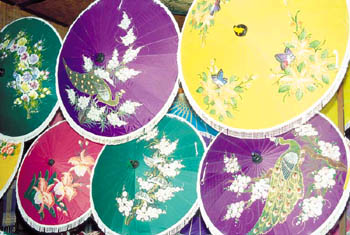|
| |
Traditional Thai Manual Arts.
 During
the Ayuthaya period, writers, painters, dancers, sculptors, architects,
musicians, and skilled craftsmen came under the royal patronage of kings and the
nobility. Thai architects and artists were responsible for building and
decorating palaces, monasteries, and shrines in conventionally acceptable forms
and styles. Unlike their Western counterparts, they were not expected to display
revolutionary originality or inventiveness. Thus art and craftsmanship were
transmitted from generation to generation according to rigid discipline. During
the Ayuthaya period, writers, painters, dancers, sculptors, architects,
musicians, and skilled craftsmen came under the royal patronage of kings and the
nobility. Thai architects and artists were responsible for building and
decorating palaces, monasteries, and shrines in conventionally acceptable forms
and styles. Unlike their Western counterparts, they were not expected to display
revolutionary originality or inventiveness. Thus art and craftsmanship were
transmitted from generation to generation according to rigid discipline.
In an attempt to provide general training to Thai craftsmen, especially those
who worked in the palaces, the Krom Chang Sip Mu (Organization of the Ten Crafts)
was established. According to Prince Pradit Worakarn, who was given charge of
the Chang Sip Mu Department during the reign of King Rama V, the original
organization in fact covered at least 13 different craftsmen: drawers, paper-makers,
engravers, figuremakers, modellers, plasterers, lacquerers, metal beaters,
turners, moulders, wood-carvers, sculptors, and carpenters.
In the Bangkok period, these were grouped into 10 divisions; drawing (whi ch
included draughtsmen, painters, muralists, and manuscript illustrators),
engraving (woodcarvers, engravers on metal, precious metal inlay), turning (lathe-workers,
carpenters and joiners, glass mosaic workers), sculpting (paper sculptors,
decorative fruit and vegetable carvers), modelling (beeswax moulders and bronze
casters, mask and puppet makers), figure making (dummy and prototype maker),
moulding (craftsmen in bronze and metal casting), plastering (bricklayers, lime
plasterers, stucco workers and sculptors), lacquering (masters of lacquerware
and mother-of-pearl inlay), and beating (meatal beaters and finishers of metal
articles).
Contemporary Thai arts and crafts, though modernized to some extent through
improved technology are still very much inspired by tradition. Ranging from
delicately wrought silverware to numerous utilitarian items of everyday life,
they are part of the kingkom's rich cultural heritage.
|